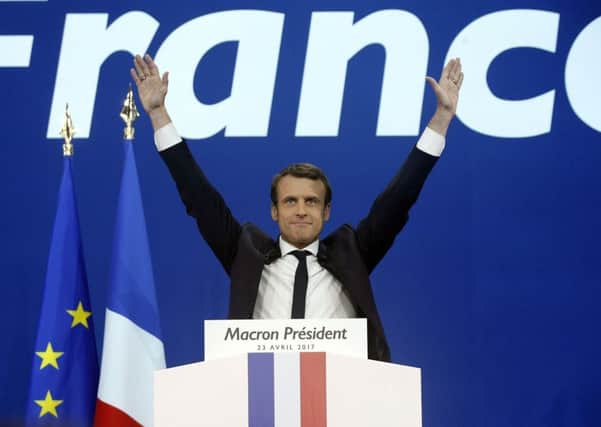YP Comment: Changing of the guard - Outsiders in French election run-off


Now France is the latest country to leave its political establishment with a bloody nose. Next month’s presidential run-off will be between the populist Marine Le Pen and centrist Emmanuel Macron following Sunday’s historic first-round which saw the ruling political class roundly rejected.
This is the first time since the post-war period that both of the two main political parties from the right and left have failed to reach the run-off.
Advertisement
Hide AdAdvertisement
Hide AdMacron and Le Pen come from opposite ends of the political spectrum. Le Pen leads the Eurosceptic, anti-immigrant Front National party, while the untested Macron – who has never held elected office and only founded his own political movement just last year – is a self-styled liberal and unashamedly pro-EU.
What unites them is the fact they are both viewed as political outsiders and reflect a growing desire among disillusioned voters across Europe and beyond to break the status quo.
We are living in a world where old political certainties are being whittled away and where the battle lines between right and left are often becoming blurred. In France, Macron is being touted as the favourite to become the country’s next president, but if the last 12 months have taught us anything it’s that no election is a foregone conclusion.
There is much at stake, and not just for France. The future of the European Union could hinge on the outcome of next month’s presidential election which carries with it ramifications for Britain, too.
Advertisement
Hide AdAdvertisement
Hide AdWhatever the outcome, though, we do know one thing for certain – Europe’s political landscape is experiencing a seismic shock.
Time for policies not rhetoric
IF anyone thought the general election was going to be conducted in an atmosphere of mutual respect that notion has been quickly dispelled.
We have already seen the Tories targeting Jeremy Corbyn’s fitness for office with the Conservative Party’s chairman Sir Patrick McLoughlin saying the Labour leader is “not suitable” to be Prime Minister, and now Mr Corbyn has hit back urging Scottish voters to reject the “vicious” Tories.
We also had SNP leader Nicola Sturgeon warning of the “high price” of voting for the Tories, saying the party has been taken over by hardliners.
Advertisement
Hide AdAdvertisement
Hide AdWhat this all amounts to, however, is nothing more than a phoney war of words that so far has been big on rhetoric and soundbites but short on concrete policy proposals.
In just over six weeks the country will go to the polls to elect a government that will be required to extricate Britain from the European Union on the most advantageous terms. On top of this there are crucial issues that need to be addressed such as social care funding, housing, education and the future of our creaking transport network.
Here in Yorkshire it is vitally important that we elect a cohort of MPs on June 8 who will become passionate advocates for the county. To do that, though, voters need to be able to challenge candidates about their policies and actually feel like they have a meaningful role to play in the democratic process.
If not we run the risk of ‘election fatigue’ creeping in. Which is why the sooner we can see each of the party’s manifestos and get down to the nitty gritty the better.
Heartbeat creator dies aged 80
Advertisement
Hide AdAdvertisement
Hide AdDuring its heyday Heartbeat was essential Sunday night viewing, regularly drawing in TV audiences of more than 14 million.
Set during the 1960s in the fictional village of Aidensfield, this gently evocative police drama was the brainchild of Peter Walker, who has died at the age of 80. Mr Walker, under his pen name of Nicholas Rhea, drew on his own experiences as a local bobby for his Constable books which provided the inspiration for the hugely popular TV series that ran for 18 years.
It wasn’t just a hit with viewers, it also helped make Goathland, where the series was predominantly filmed, one of the county’s tourist hotspots with fans flocking to the North York Moors to catch a glimpse of their favourite locations.
Today, a quarter of a century after the show first aired on our screens, Heartbeat continues to be watched, and enjoyed, around the world – proof that good storytelling never goes out of fashion.